The season is turning. Each morning, frost coats the fallen oak leaves outside the small cabin I live in. Fog clings to valley bottom. As the days grow short and dark, my body calls for me to rest, sleep, and move slowly. It is in biological rebellion against the speed and demands of modernity.
Winter is a good time for reflection. That’s what I’ll do in this post: introduce you to the writing I’ve published over the last year, and reflect on the experiences behind these pieces.
For those who are new here, This is Biocentric, a newsletter about sustainability, overshoot, greenwashing, and resistance. It’s written by Max Wilbert, co-author of Bright Green Lies: How the Environmental Movement Lost Its Way and What We Can Do About It and co-founder of Protect Thacker Pass.
If you want to follow, you can subscribe for free. Paid subscribers, in return for supporting this publication, our mentorship program, and the activism you see here, receive access to private posts containing behind-the-scenes reports and unreleased drafts.
Gift subscriptions are also available.
In 2021, I launched a campaign to stop the construction of the Thacker Pass lithium mine in northern Nevada, on traditional lands of the Northern Paiute and Western Shoshone people.
The effort has involved working closely with Native friends and allies, which has been a true joy — despite many challenges like the stress of a long fight, threats of violence, fines from the government, long months away from family, and being sued by Lithium Nevada Corporation (a subsidiary of Lithium Americas Corporation).
It’s also exposed the ethnocentrism and racism of the company and its shareholders, the Federal government, and supporters of lithium mining as “progress.” I had this piece in mind for quite some time, and finally pulled together the different elements in January. This type of ethnocentric racism, in my opinion, is a defining characteristic of industrial societies.
In early 2024, I heard that Earth Island Journal was preparing an issue on climate and labor. Anticipating that the discourse could mirror much of what we see in mainstream environmentalism (essentially: “Green energy and technology is great, it will create lots of jobs, let’s get to building!”), I felt obliged to pitch an article exploring an international biocentric perspective on these topics.
The result was this piece, which highlights voices from organized labor and front-line mining communities, and proposes a revolutionary approach to re-building a radical labor movement. Writing this piece was a lengthy and meticulous process. It required three major re-writes.
There are three reasons I focus on critiquing “green energy” and “green tech” in my recent work. The first is simple: they are harmful to our planet, and to pretend otherwise is a lie.
The second is that they are leading us astray from actual solutions to the global warming. It’s strategically important to shift the environmental movement away from false solutions.
Third: there are thousands of organizations and millions of people fighting to stop fossil fuels. This is important (although, with respect, mostly ineffective so far). Oil is not only the main driver of warming, it fuels road building, chainsaws, industrial agriculture, plastics production, and most activities that are destroying our planet.
In the past, I’ve been involved in fighting coal export terminals and coal transport by rail in the Pacific Northwest, tar sands pipelines and mining in Washington and Utah, and pipeline construction in British Columbia. Now, however, I don’t live in an area with much fossil fuel activity.
Nonetheless, climate matters. A lot. So, early this year, I republished this story which I wrote in 2010 after accompanying a National Science Foundation expedition to the Russian Arctic to study global warming. Even after fifteen years, this is still a piece I’m proud of, and an experience which profoundly affected me.
Friends and family who are concerned about what’s happening to our planet may appreciate gift subscriptions to Biocentric, which are now available.
The irony of this stills amazes me. As myself and others were protesting the Thacker Pass lithium mine in spring of 2023, several publications ran front-page stories calling for more destruction of the land to build so-called “green technologies.”
This piece critiques Bill McKibben and other mainstream environmentalists who appear to be basically ok with the idea of sacrificing thousands of biodiverse, culturally important places for renewable energy. The title is an homage to the great film Dr. Strangelove, or: How I Stopped Worrying and Learned to Love the Bomb. McKibben actually briefly responded to me online after I wrote this piece. Judge his perspective for yourself.
Back in 2019, I spoke at a few permaculture gatherings. My message was simple: this is wonderful, but we can’t forget that empires deliberately destroy alternatives when they pose a threat.
If we want to change the world, and not just create small (albeit beautiful and important) refuges here and there, we need to consider strategies for resisting and dismantling industrial capitalism. I rewrote that material and published it here back in September.
In May I published a piece I was asked to write a number of years ago as an introduction to a French-language translation of the Earth First! Direct Action Manual. It provides a history of direct action and explains the rationale for it. This piece was a lot of fun to write.
In August, I announced the new Biocentric Mentorshop Program, “a 12-month training for committed but inexperienced activists… to discuss organizing projects, define strategy and set goals, work on specific real-world learning assignments, and reflect on experiences to solidify learning.”
The program began several months ago, and I’m now working with a small but powerful cohort: three very intelligent and dedicated individuals. Collaboratively, we’ve identified different learning priorities and are working to develop skills and experience. It’s an experiment, but so far I’m enjoying it. And it’s a collective effort: paid subscriptions to this newsletter help subsidize the costs of the mentorship program.
In March, the legal defense team for the Thacker Pass Six filed the first ever “biodiversity necessity defense.” Essentially, we’re arguing that actions to defend non-human life are so critical, given the extinction crisis globally, that even breaking the law is morally justified. Here’s the press release that I helped draft:
In June, following a Wilderness First Responder recertification course that included some great material about trauma and psychological first aid, I wrote this piece about adapting first-responder trauma frameworks to activists. This is another one that I’d been mulling for two years before actually writing it. You probably either need this yourself, or know someone who does. Please share, and let’s help take care of each other.
I was blessed to be born into a family that took me camping starting at a young age, and further blessed to have the opportunity to begin guiding others into wilderness starting at age 14. In this piece, I reflect on my teaching philosophy when guiding youth into nature, which is summed up in the title.
When the World Trade Organization held it’s conference in Seattle in 1999, I was only 11 years old. But the cross-movement alliances and internationalist perspective exemplified in the anti-WTO protests have had a profound impact on my politics and on the world. In this piece, I argue that these politics are just as relevant today as they ever were.
The biggest energy threat to the ecology of my region is industrial-scale wind power development in the Pacific Ocean. In this piece, which originally ran in the opinion section of The Oregonian, I write: “It is a little-known fact Oregon is now facing the largest energy development project in generations: more than 1,800 square miles of offshore wind turbines proposed for the deep waters off the central and southern Oregon coast.
That’s an area 8 times larger than Portland, Gresham, Hillsboro, and Beaverton combined, and more than 6 times the size of Crater Lake National Park [covered with] dozens or hundreds of steel towers, each as tall as the Empire State Building, each floating on a steel platform the size of a baseball stadium and anchored to the sea floor with hundreds of miles of steel cables and chains as thick as a human body.”
Journalism was a passion of mine for many years. I studied environmental journalism at University, but ended up dropping out of that program in favor of designing my own major (“Environmental Advocacy and Communication”) out of disgust at what Chris Hedges calls the “creed of objectivity.” In this piece, I critique the media and describe how mass media — CNN, The New York Times, NPR, Fox News, MSNBC, BBC, etc. — protect the status quo.
One of my goals for this Substack newsletter is to share specific techniques and skills with readers, so that you can be more effective in your own activism, advocacy, and action. Despite the previous piece describing the problems with mass media, telling our stories is important. This piece deals with this messy reality and provides some recommendations for effective communication.
Older Pieces
Digging deeper into the archives for new subscribers, here are some of my favorite pieces published here prior to 2024:
Finally, a Thank You
The end of the year is a fitting time for gratitude. As I wrote in April:
As one journey ends and another begins, I want to pause and acknowledge those who walk beside me. Organizing is not solitary. You may see my face on video or my name on these articles, but what you don’t see is the dozens of people behind the scenes: my sweetheart, family, friends, donors and subscribers, advisors, and beyond. This work would be impossible without you.


















































Thanks for your dedicated writing, Max.
Thanks, Max, for all of your fine, heart-felt work and writing. Have a VERY HAPPY HOLIDAYS! Gregg